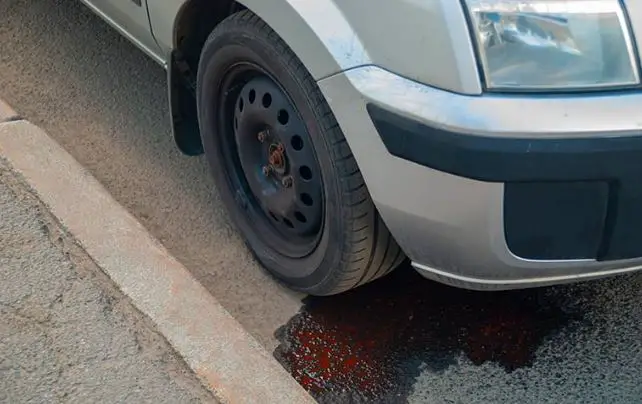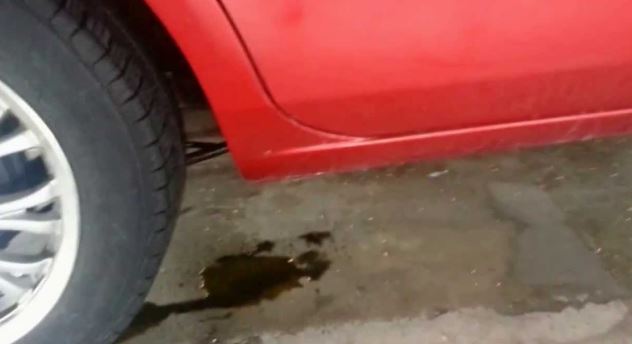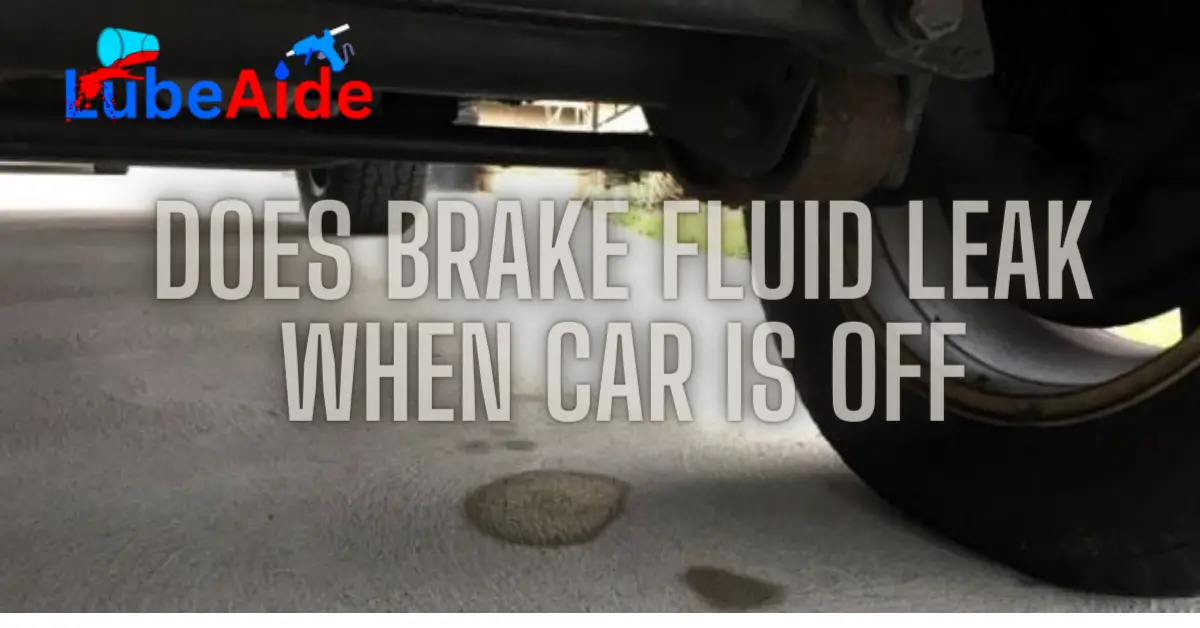Curious about brake fluid leaks when your car is not running? Discover the truth behind this common concern. Brake fluid leaks can raise questions and leave car owners wondering about the possible causes. In this guide, we’ll explore whether brake fluid leaks occur when your car is off and provide insights into diagnosing and addressing these issues effectively. Stay informed and keep your vehicle’s performance and safety intact. Let’s delve into the details.
Causes
Worn out brake components
When brake components become worn out, they can cause brake fluid leaks. This can happen because the brake components are no longer able to maintain a tight seal, which allows brake fluid to escape. The most common worn out brake components that can cause brake fluid leaks are the brake calipers, brake pads, and brake rotors.
Damaged brake lines
Brake lines are an essential part of the braking system, and they are responsible for transporting brake fluid from the master cylinder to the brake components. When the brake lines become damaged, brake fluid can leak out. The most common causes of damaged brake lines are corrosion, wear and tear, and physical damage from debris or accidents.
Master cylinder failure
The master cylinder is the heart of the braking system, and it is responsible for producing the pressure that is needed to stop the vehicle. When the master cylinder fails, it can cause brake fluid leaks. The most common causes of master cylinder failure are wear and tear, corrosion, and damage from debris or accidents.
In summary, brake fluid leaks can be caused by worn out brake components, damaged brake lines, and master cylinder failure. It is essential to regularly check the brake components and brake lines for signs of wear and damage to prevent leaks from occurring. If a brake fluid leak is suspected, it is important to have the vehicle inspected by a qualified mechanic to determine the cause of the leak and to make the necessary repairs.
Does Brake Fluid Leak When Car is Off

Brake fluid is a vital component of a car’s braking system. It is responsible for transmitting the force from the brake pedal to the brake calipers, which in turn apply pressure to the brake pads and slow down the vehicle. However, like any other fluid, brake fluid can leak, which can lead to a loss of braking power and potentially dangerous situations.
One question that car owners may have is whether brake fluid can leak when the car is off. The answer is yes, brake fluid can leak even when the car is not in use. There are a few reasons why this might happen:
- Leaking Master Cylinder: The master cylinder is the component that stores the brake fluid and sends it to the brake calipers. If the master cylinder is leaking, brake fluid can escape and cause a loss of braking power.
- Leaking Brake Lines: The brake lines are the tubes that carry the brake fluid from the master cylinder to the brake calipers. If one of these lines is damaged or corroded, brake fluid can leak out.
- Leaking Wheel Cylinders or Calipers: The wheel cylinders and calipers are the components that apply pressure to the brake pads. If one of these components is leaking, brake fluid can escape and cause a loss of braking power.
It is important to note that even a small brake fluid leak can have serious consequences. In the end, brake fluid can leak when the car is off due to a variety of reasons. It is important for car owners to be aware of the signs of a brake fluid leak and to have their vehicles inspected regularly to ensure that the braking system is functioning properly.
Symptoms

When a car’s brake fluid leaks, there are several symptoms that drivers may experience. These symptoms can indicate a serious problem with the braking system, and should not be ignored.
Brake pedal feels spongy or goes to the floor
One of the most common symptoms of a brake fluid leak is a spongy or soft brake pedal. This can occur when air enters the brake lines due to a loss of brake fluid. When the brake pedal is pressed, the air compresses, causing the pedal to feel spongy or go all the way to the floor. This can reduce the effectiveness of the brakes and make it difficult to stop the vehicle.
Brake warning light is on
Another symptom of a brake fluid leak is a brake warning light on the dashboard. This light may come on if the brake fluid level is low or if there is a problem with the brake system. If the light comes on, it is important to have the vehicle inspected as soon as possible to determine the cause of the problem.
Low brake fluid level
A low brake fluid level is another sign of a brake fluid leak. The brake fluid reservoir is located under the hood of the car, near the brake master cylinder. Drivers should check the brake fluid level regularly and add fluid as needed. If the level continues to drop, it is important to have the vehicle inspected by a qualified mechanic.
In summary, a brake fluid leak can cause several symptoms, including a spongy brake pedal, a brake warning light on the dashboard, and a low brake fluid level.
Diagnosis
When a car owner suspects that their brake fluid is leaking, the first step is to diagnose the problem. There are several methods that a mechanic can use to determine the cause of the leak.
Visual Inspection of Brake Components and Lines
The mechanic will start by visually inspecting all of the brake components and lines. This includes looking for any signs of damage or wear on the brake pads, rotors, calipers, and brake lines. The mechanic will also check the master cylinder for any signs of leakage.
Pressure Test of Brake System
If the visual inspection does not reveal any obvious signs of a leak, the mechanic may perform a pressure test of the brake system. This involves using a special tool to pressurize the brake system and then checking for any leaks.
Checking for Leaks
If the pressure test does not reveal any leaks, the mechanic may need to perform a more detailed check for leaks. This involves using a dye to trace the path of the brake fluid and identify the source of the leak. A leaking brake system can compromise the safety of the vehicle and should be addressed immediately.
Repair
When a brake fluid leak is detected, it is important to repair the issue as soon as possible to ensure the safety of the vehicle. There are several steps that can be taken to repair a brake fluid leak.
Replace worn out brake components
One common cause of a brake fluid leak is worn out brake components. Over time, brake pads, rotors, and calipers can become worn and damaged, causing leaks to occur. If this is the case, the worn out components should be replaced with new ones.
Repair or replace damaged brake lines
Another common cause of a brake fluid leak is damaged brake lines. Brake lines can become corroded, cracked, or damaged due to wear and tear or exposure to the elements. The brake lines should be fixed or replaced as soon as possible if they are damaged.
Replace master cylinder
In some cases, a brake fluid leak may be caused by a faulty master cylinder. The master cylinder is responsible for supplying pressure to the brake system, and if it is not functioning properly, it can cause leaks to occur. If the master cylinder is the cause of the leak, it should be replaced with a new one.
Overall, repairing a brake fluid leak is essential for the safety of the vehicle and its occupants. By replacing worn out components, repairing or replacing damaged brake lines, and replacing a faulty master cylinder, the brake system can be restored to its proper working order.
Prevention
Regular brake system maintenance
Regular brake system maintenance is key to preventing brake fluid leaks when the car is off. It is recommended to have brake fluid flushed and replaced every two years or 24,000 miles, whichever comes first. This will help ensure that the brake system is functioning properly and prevent any leaks from occurring.
In addition to regular brake fluid replacement, it is important to have the brake system inspected regularly. This can help identify any potential issues before they become major problems. A qualified mechanic can inspect the brake system and identify any leaks or other issues that need to be addressed.
Avoiding hard braking and sudden stops
Hard braking and sudden stops can put a lot of stress on the brake system, which can lead to leaks. To prevent this from happening, it is important to avoid hard braking and sudden stops whenever possible. This means driving defensively and leaving plenty of space between your car and the car in front of you.
In addition, it is important to avoid riding the brakes. This can cause the brake system to overheat and put additional stress on the system, which can lead to leaks. Instead, try to use engine braking or downshifting to slow down the car whenever possible.
By following these tips, car owners can help prevent brake fluid leaks when the car is off. Regular brake system maintenance and safe driving practices are key to keeping the brake system in good working order.
FAQs About Does Brake Fluid Leak When Car is Off
How can I identify a brake fluid leak?
There are a few signs that can indicate a brake fluid leak. These include a low brake fluid level in the master cylinder reservoir, a soft or spongy brake pedal, the presence of fluid puddles beneath the vehicle, or a noticeable decrease in braking performance. Additionally, if you observe any visible signs of fluid dripping or spraying from the brake system components, it could be an indication of a leak.
Is it dangerous to drive with a brake fluid leak?
Yes, it is dangerous to drive with a brake fluid leak. Brake fluid is crucial for the proper functioning of the braking system, as it transfers the force from the brake pedal to the brake components. A leak can lead to a loss of brake fluid, resulting in decreased braking performance or a complete brake failure. It is essential to address brake fluid leaks promptly and avoid driving the vehicle until the issue is resolved.
Can I fix a brake fluid leak myself?
Fixing a brake fluid leak yourself depends on your level of expertise and knowledge in automotive repairs. Some minor leaks, such as loose fittings, can be addressed by tightening them. However, more significant issues, such as damaged brake lines or calipers, require professional attention. It is generally recommended to have a qualified mechanic inspect and repair brake fluid leaks to ensure they are properly resolved.
How much does it cost to repair a brake fluid leak?
The cost of repairing a brake fluid leak can vary depending on the cause and severity of the leak, as well as the specific vehicle and location. Simple repairs, such as replacing a damaged brake hose, may cost around $100 to $200. However, if the issue involves more extensive repairs or component replacements, the cost can range from a few hundred dollars to several hundred dollars or more.
Can I prevent brake fluid leaks?
While it is not possible to completely eliminate the risk of brake fluid leaks, proper maintenance and care can help reduce the chances. Regularly inspecting the brake system, checking the brake fluid level, and addressing any signs of leakage promptly can help prevent small issues from escalating into more significant problems. Additionally, following the manufacturer’s recommended brake fluid change intervals can help maintain the integrity of the brake system components.
Final Thought
In the end, brake fluid does not typically leak when a car is turned off. Brake fluid is a vital component of a vehicle’s braking system and is responsible for transferring force from the brake pedal to the brake components, allowing the car to slow down or stop. The brake fluid is contained within a sealed system, which includes the master cylinder, brake lines, and calipers.
If there is a leak in the brake system, it is more likely to occur when the car is in use and the brakes are being applied. The pressure generated by pressing the brake pedal can cause fluid to escape from a compromised seal or damaged brake line.
However, it’s worth noting that certain conditions or factors could contribute to the appearance of a brake fluid leak when the car is off. For instance, if the brake system has recently been used, residual pressure can remain in the system, causing a small amount of fluid to seep out after the car is turned off. This seepage might create the appearance of a leak, but it is not indicative of an active leak in most cases.
Related Topics:
- why does my oil light come on when i brake
- What Can I Use Instead of Brake Fluid
- Can You Use Transmission Fluid for Brake Fluid
- Is It Necessary to Change Brake Fluid Every Two Years
- How to Dispose of Brake Fluid
- Mercon V Vs Mercon LV
- Marvel Mystery Oil vs Transmission Fluid
- Brake Fluid vs Transmission Fluid


